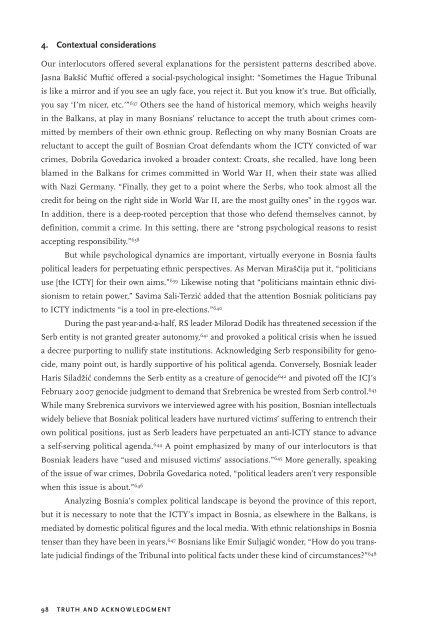That Someone Guilty Be Punished - International Center for ...
That Someone Guilty Be Punished - International Center for ...
That Someone Guilty Be Punished - International Center for ...
Create successful ePaper yourself
Turn your PDF publications into a flip-book with our unique Google optimized e-Paper software.
4. Contextual considerations<br />
Our interlocutors offered several explanations <strong>for</strong> the persistent patterns described above.<br />
Jasna Bakšić Muftić offered a social-psychological insight: “Sometimes the Hague Tribunal<br />
is like a mirror and if you see an ugly face, you reject it. But you know it’s true. But officially,<br />
you say ‘I’m nicer, etc.’” 637 Others see the hand of historical memory, which weighs heavily<br />
in the Balkans, at play in many Bosnians’ reluctance to accept the truth about crimes committed<br />
by members of their own ethnic group. Reflecting on why many Bosnian Croats are<br />
reluctant to accept the guilt of Bosnian Croat defendants whom the ICTY convicted of war<br />
crimes, Dobrila Govedarica invoked a broader context: Croats, she recalled, have long been<br />
blamed in the Balkans <strong>for</strong> crimes committed in World War II, when their state was allied<br />
with Nazi Germany. “Finally, they get to a point where the Serbs, who took almost all the<br />
credit <strong>for</strong> being on the right side in World War II, are the most guilty ones” in the 1990s war.<br />
In addition, there is a deep-rooted perception that those who defend themselves cannot, by<br />
definition, commit a crime. In this setting, there are “strong psychological reasons to resist<br />
accepting responsibility.” 638<br />
But while psychological dynamics are important, virtually everyone in Bosnia faults<br />
political leaders <strong>for</strong> perpetuating ethnic perspectives. As Mervan Miraščija put it, “politicians<br />
use [the ICTY] <strong>for</strong> their own aims.” 639 Likewise noting that “politicians maintain ethnic divisionism<br />
to retain power,” Savima Sali-Terzić added that the attention Bosniak politicians pay<br />
to ICTY indictments “is a tool in pre-elections.” 640<br />
During the past year-and-a-half, RS leader Milorad Dodik has threatened secession if the<br />
Serb entity is not granted greater autonomy, 641 and provoked a political crisis when he issued<br />
a decree purporting to nullify state institutions. Acknowledging Serb responsibility <strong>for</strong> genocide,<br />
many point out, is hardly supportive of his political agenda. Conversely, Bosniak leader<br />
Haris Siladžić condemns the Serb entity as a creature of genocide642 and pivoted off the ICJ’s<br />
February 2007 genocide judgment to demand that Srebrenica be wrested from Serb control. 643<br />
While many Srebrenica survivors we interviewed agree with his position, Bosnian intellectuals<br />
widely believe that Bosniak political leaders have nurtured victims’ suffering to entrench their<br />
own political positions, just as Serb leaders have perpetuated an anti-ICTY stance to advance<br />
a self-serving political agenda. 644 A point emphasized by many of our interlocutors is that<br />
Bosniak leaders have “used and misused victims’ associations.” 645 More generally, speaking<br />
of the issue of war crimes, Dobrila Govedarica noted, “political leaders aren’t very responsible<br />
when this issue is about.” 646<br />
Analyzing Bosnia’s complex political landscape is beyond the province of this report,<br />
but it is necessary to note that the ICTY’s impact in Bosnia, as elsewhere in the Balkans, is<br />
mediated by domestic political figures and the local media. With ethnic relationships in Bosnia<br />
tenser than they have been in years, 647 Bosnians like Emir Suljagić wonder, “How do you translate<br />
judicial findings of the Tribunal into political facts under these kind of circumstances?” 648<br />
98 TRUTH AND ACKNOWLEDGMENT

















